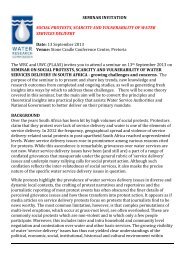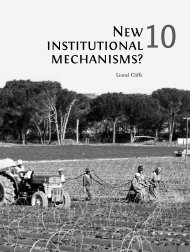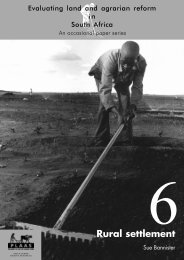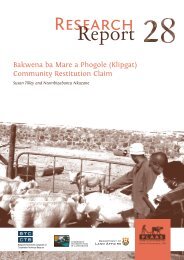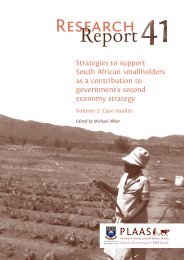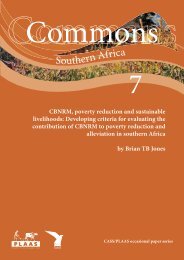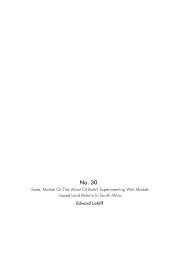A critical appraisal of South Africa's market-based land reform policy
A critical appraisal of South Africa's market-based land reform policy
A critical appraisal of South Africa's market-based land reform policy
Create successful ePaper yourself
Turn your PDF publications into a flip-book with our unique Google optimized e-Paper software.
Chapter 6: LRAD projects in Limpopo<br />
The group first heard about the LRAD<br />
programme at a local meeting organised<br />
by the Polokwane Municipality at which<br />
the DLA Provincial Director spoke about<br />
LRAD. They also heard about it on the<br />
radio. The Provincial Director is from the<br />
area and helped by advising them ‘as a<br />
local woman’ (interview 36). The group<br />
applied some time in early 2002 and was<br />
told the project was approved around July<br />
<strong>of</strong> the same year, although according to<br />
DLA records it was approved on 2 August<br />
2002. However, at the time <strong>of</strong> the interview<br />
in March 2003, the project participants<br />
had not yet received the transfer <strong>of</strong><br />
the <strong>land</strong> or started production.<br />
Members <strong>of</strong> the group travelled at their<br />
own initiative and cost to the DLA <strong>of</strong>fice<br />
in Polokwane to make and follow up on<br />
the applications. The project members<br />
incurred a lot <strong>of</strong> transport costs travelling<br />
to the DLA <strong>of</strong>fice and felt that the process<br />
was slow and inefficient with ‘a lot <strong>of</strong><br />
hassles’ (interview 19). This contributed to<br />
a number <strong>of</strong> group members dropping out<br />
when they saw no progress in the project.<br />
The LRAD application itself went reasonably<br />
smoothly; problems seem to have<br />
arisen with registering a trust and the<br />
transfer <strong>of</strong> title on the property.<br />
The members <strong>of</strong> the group rejected the<br />
agents appointed by DLA to register the<br />
trust and this caused some tensions<br />
between the group and the DLA Project<br />
Officer whom the Chairperson <strong>of</strong> the<br />
group referred to as ‘unco-operative and<br />
rude’ (interview 19). The Chairperson<br />
complained that she was instructed by the<br />
Project Officer to sign blank forms that she<br />
was told were for the change <strong>of</strong> ownership,<br />
but at the time <strong>of</strong> the interview the group<br />
had still not been able to take occupation<br />
<strong>of</strong> the farm. She was also asked to sign a<br />
form to confirm receipt <strong>of</strong> the grant<br />
money, but refused to sign, as the group<br />
had received no money.<br />
The group members are unemployed<br />
although they have an existing project on<br />
some <strong>land</strong> close to Mankweng and have<br />
managed to sell some produce to a local<br />
school. They have no experience <strong>of</strong><br />
commercial farming, but have been doing<br />
subsistence farming.<br />
The ‘own contribution’ <strong>of</strong> the beneficiaries<br />
to the project was in the form <strong>of</strong><br />
labour and calculated at R5 000 per<br />
person, making a total <strong>of</strong> R150 000. They<br />
did not get any loan or make any contribution<br />
<strong>of</strong> assets. Each beneficiary was<br />
allocated the minimum grant <strong>of</strong> R20 000<br />
and these grants were combined to give<br />
the group access to R600 000. The project<br />
is to acquire a 24ha farm from a white <strong>land</strong><br />
owner for the asking price <strong>of</strong> R280 000, an<br />
amount that had been confirmed by a<br />
valuer as a fair <strong>market</strong> price. The balance<br />
<strong>of</strong> the grant is to be used for the purchase<br />
<strong>of</strong> a vehicle and other equipment needed<br />
for the project.<br />
Production has not started as the <strong>land</strong><br />
transfer has not gone through, but it is the<br />
intention <strong>of</strong> the project to grow mealies<br />
and other vegetables for their own use and<br />
to sell locally.<br />
Vaalkop<br />
Vaalkop is a 1 897ha piece <strong>of</strong> <strong>land</strong> that<br />
was part <strong>of</strong> a mission station owned by the<br />
Catholic Church. It is located about 30km<br />
south west <strong>of</strong> Polokwane in the former<br />
home<strong>land</strong> <strong>of</strong> Lebowa. There has been a<br />
community living on the <strong>land</strong> for generations.<br />
They are descendents <strong>of</strong> the early<br />
converts who came to stay close to the<br />
church. No interview was conducted with<br />
the beneficiaries, but information was<br />
obtained from the DoA and DLA<br />
(interviews 32 and 33).<br />
The LRAD project was initiated by the<br />
church that approached DLA for assistance<br />
when it wished to dispose <strong>of</strong> the <strong>land</strong> to<br />
the community living there. The <strong>land</strong> was<br />
donated by the church and all those already<br />
living on it are listed by DLA as the<br />
LRAD beneficiaries. This project has by<br />
far the largest number <strong>of</strong> beneficiaries <strong>of</strong><br />
DLA-implemented LRAD projects in<br />
Limpopo, accounting for 203 out <strong>of</strong> a<br />
total <strong>of</strong> 251 (that is, over 80%) (Makharamedzha<br />
2002).<br />
The own contribution by the beneficiaries<br />
was in the form <strong>of</strong> their labour and<br />
33




